Moving to Pattaya in 2021 – that will be the topic of today’s article.
Before introducing this article, if you are interested in our core services which are expat financial, insurance and mortgages, you can contact me here.
The best time to consider your financial situation is when you are moving to a new country.
Introduction
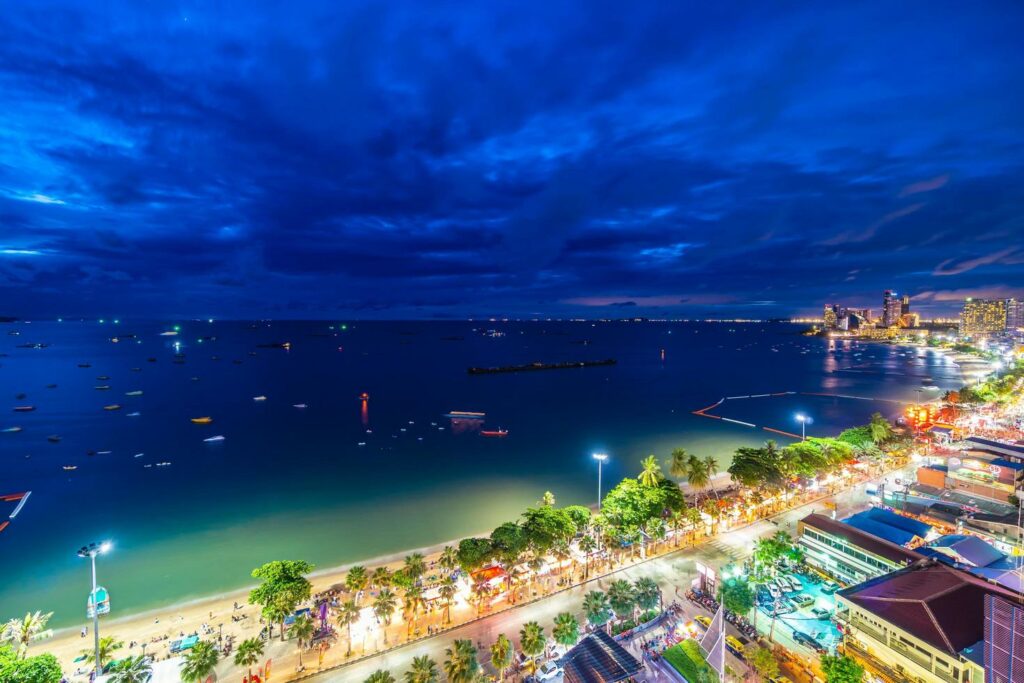
Thailand is one of the most comfortable and hospitable countries in Southeast Asia. Tourists are attracted here by the mild tropical climate, many wonderful sea resorts, friendly local people, and affordable prices. Therefore, it is not surprising that many travelers have a desire to stay in the land of smiles for a long time.
Thousands of tourists choose Pattaya every year, and hundreds of people move to Thailand for a long time and choose Pattaya again. This is due to many factors – a developed infrastructure – an extensive and varied transport system, entertainment facilities, hospitals, parks, and gardens.
And although Pattaya has sea and beaches of “urban quality”, the nearest islands with turquoise water and white sand are just a stone’s throw away. Pattaya is famous for its high standard of living and at the same time its rather low cost. Let’s try to understand how you can move to Pattaya and while that consider some prices and features of long-term stays in this city in the southeast of Thailand.
How to move to Thailand for permanent residence worries those who appreciated all the delights of the resort. There are several reasons for moving. Among them are the picturesque tropical landscape, mild climate, high standard of living, and the opportunity to touch the Buddhist teachings.
Without obtaining permanent residence, a foreigner can live in Thailand for no more than a month. But many who have been there are thinking about moving.
According to local law, Thai citizenship is practically inaccessible to foreigners. However, there are many long-term visas that allow you to fulfill your dream and finally move to the land of smiles.
Pros and cons of migration to Thailand, Pattaya
Before moving to Pattaya, it is advisable to live there for at least 3 months. It is not uncommon for people to choose this resort for wintering. During this period, you can get closely acquainted with the culture, climate, and infrastructure of the country. For some tourists, such a trip helps to abandon the idea of moving. Others finally decide to carry out their plans. The main thing is to get acquainted not only with the advantages of the resort but also with its disadvantages.
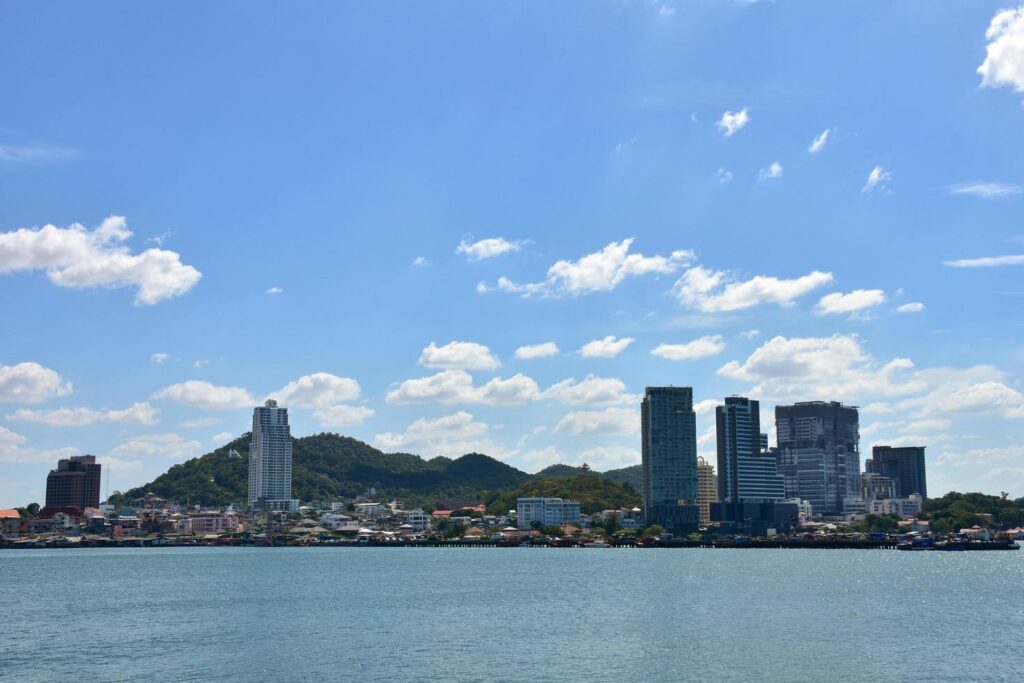
Here are the main pros:
- Close to the sea. In many countries, this feature is considered a strong argument for moving. Living in Thailand, you can go to the beach at any time. The most popular islands washed by azure waters include Phi Phi, Phuket, Koh Samui and Krabi.
- High level of security. According to statistics, about 35 mln. Comes to Thailand every year. tourists. That is why the local authorities decided to strengthen protective measures.
- Affordable prices. For visitors, prices for food, housing, things and household items are much more favorable than at home. In addition, there is no utility bill in Thailand.
- Good attitude of the locals. Thailand has a special mentality. Thais are considered to be friendly and open people. They don’t need much reason to smile at a stranger. Therefore, many tourists tend to return there again.
- Unique natural landscape. Thailand is famous not only for its sandy coastline, but also for its lush tropical vegetation. Rare representatives of flora and fauna are also represented here.
- Mild climate. Winter in the usual sense does not happen in Thailand. You can swim in the sea here all year round. The air temperature ranges from + 30 ° C to + 35 ° C. In the northern part of the kingdom, it can drop to + 25 ° C.
- Developed economy. Thailand is famous for its stable economy. New Asian companies open on its territory every year. Today, Thailand is in 9th place in the list of vehicle manufacturers. It is distinguished by the absence of unemployment, high level of exports and low external debt.
- Inexpensive housing. The most lucrative areas for investment in Thailand include construction. That is why there are no difficulties with buying a home here. You can choose real estate for every taste.
- Ease of obtaining a visa and permanent residence. Visitors to Thailand are offered several programs, by participating in which you can change your place of residence. Both a retired person, a student or a middle-aged person can move.
And of course, let’s see some cons:
- The strangeness of the mentality. Thais are considered slow and lack of initiative. Their way of life is unlikely to be to the liking of the average Russian. In addition, communication with local residents is often hampered by the language barrier.
- Long-term registration of citizenship. If it is not difficult to obtain a residence permit in Thailand, then obtaining citizenship can cause difficulties. Therefore, many newcomers live in 2 countries at once.
- High prices for foreign products. Local goods in Thailand are affordable. But everything that is brought from abroad cannot be bought for a song. Therefore, when migrating to Thailand, you will have to get used to the local cuisine or prepare for significant expenses.
- Difficulty finding a job. There are certain rules for migrants regarding employment. They cannot work in tourism, agriculture, medicine, etc. It is permissible to open your own business, but restrictions will also apply to it.
Ways to get permanent residence in Pattaya in 2021
There are several ways to move to Thailand permanently. Each of them has certain nuances. Compared to 2018, there have been no significant changes in legislation. There are several options for obtaining permanent residence:
- starting your own business;
- registration of a student visa;
- marriage with a local resident;
- obtaining a work permit;
- moving with the spouse who signed the employment agreement;
- change of residence after retirement;
- moving as an investor for the state.
Student visa
Studying in Thailand can be one of the fastest ways to move there for a long time. At the same time, it is absolutely not necessary to study at a university or graduate school.
In every major Thai city, there are a huge number of courses that foreigners can attend. Most often there are schools for teaching English or Thai, but there are also more exotic directions:
- Thai boxing;
- Thai massage;
- Thai culinary arts.
To enroll in such courses, you need to submit a passport, photographs, and a copy of the rental agreement to the school. Tuition fees usually start from 20-25 thousand baht per year. But if you want to find English courses with native speakers, then it is better to focus on 30-30 thousand.
In addition, additional costs should be considered:
- Every 3 months, a student visa must be renewed at the immigration office (analogous to the GUVM of the Ministry of Internal Affairs of the Russian Federation). The cost of the renewal is 1900 baht, for a total of 7,600 per year.
- Travel expenses to Laos, Cambodia or Malaysia. Any Thai visa can be obtained only on the territory of another state. And the student visa is no exception. Schools usually organize special visa trips to Laos for their aspiring students.
To obtain a student visa, you must first come to Thailand on a stamp for 30 days or on a tourist visa. During this time, you can independently bypass several schools and choose the most suitable option.
It should be borne in mind that you will not be able to formally become a student and then “forget” about the lectures. Now in Thailand, visa rules are closely monitored, including checking the attendance of foreign students. In addition, the courses are not a university, the time to attend them will only take a few hours a week.
According to the new visa rules, you cannot permanently live in Thailand on tourist visas. However, this does not apply to student visas.
If you have the money and time, you can endlessly study in Thailand if you change your school once a year and sign up for new courses.
However, the prospect of being an eternal student is not very attractive. Therefore, many try to derive practical benefits from their training. For example, you can improve your level of English in a good language school and find a job as a teacher in one of the Thai educational institutions yourself.
Work permit
Most of the jobs in the middle and upper segments are occupied by local residents. To obtain a Work Permit or work permit, you will have to get a job in one of the following areas:
- the science;
- top management;
- landscape and fashion design;
- technical area;
- translation and teaching of English;
- model business;
- IT technologies.
Sometimes employers find loopholes to employ visiting foreigners for prohibited positions. In Thailand, they are most often arranged by realtors, hotel administrators, tourism managers, etc. The police periodically carry out raids to identify companies operating illegally. In Thailand, there is a special struggle with them. Violators can either be imprisoned or deported to their homeland.
To get a job, a migrant needs to sign an employment contract. It needs to be renewed every year. The new document is drawn up at the embassies of other countries.
Starting a business in Pattaya
The more money a person has, the easier it will be for him to move to Thailand. Entrepreneurial activity will be a good option for obtaining permanent residence. The share of local residents, in this case, must be at least 51%. Businessmen will be offered the following conditions:
- profit must be regular, otherwise the extension of the program may be refused;
- the average capital of the company should be $ 65,500 or 2 million baht;
- the business visa is renewed annually.
Some migrants combine two schemes at once. They marry a local resident, giving him a controlling stake. This allows you to organize a profitable family business. If law enforcement agencies prove that the marriage is fictitious, punishment will follow.
Investing in Pattaya
Condominiums, hotels, and private houses can be used as investment objects in Thailand. Migrants are given the opportunity to rent out the purchased housing while receiving 9% of the profit. You can also take part in the Thailand Elite program. It involves investing at the stage of building a dwelling. As soon as they are ready, the migrant is issued a visa for up to 20 years.
To apply for permanent residence, you can use the Elite Superiority Extension or Elite Easy Access programs. According to the conditions, the visitor makes a payment and then receives the corresponding document. The duration of his service and the cost depend on the nuances of the program.
List of documents
After choosing the appropriate migration method, you need to collect a package of documents. For the first 3 years in the country you can stay on a visa. After the expiration of this period, it is required to apply for a residence permit. This requires the following documents:
- a completed questionnaire taken on the website of the migration service;
- international passport;
- certified copies of diplomas;
- 3 color photos of 3.5 x 4.5 format;
- certificate of no criminal record;
- birth certificates of children translated into English;
- a document confirming the payment of taxes;
- medical documents;
- bank statement for the last 3 years;
- marriage certificate (if any);
- ownership or rental agreement.
People wishing to open a business in Thailand need to take additional documents with them – receipts for payment of taxes, company registration data, reports on current activities for 1 year. Investors will have to bring with them tax certificates, certificates confirming the purchase of an investment portfolio, and paper on payment of contributions.
After submitting the documentation, an exam is required. The representative of the migration service will ask a series of questions that will need to be answered. Only then can you expect to receive a residence permit.
Expenses
Obtaining a visa will cost $ 260. The visa fee must be paid on the day of submission of the documents. After the approval of the residence permit, $ 6,270 must be deposited into the account. When you marry a local Thai resident, you will need to pay $ 3135. If you use the services of lawyers and take into account additional expenses, you need to add another $ 1500 to the total amount.
The standard and cost of living in Pattaya
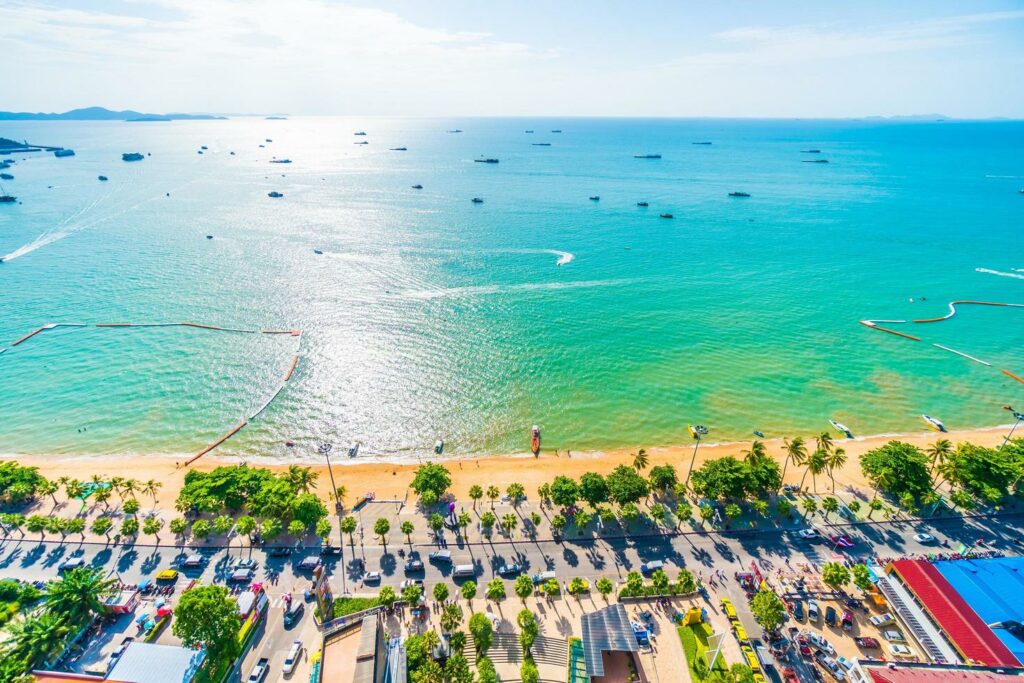
After discussing the options of moving to Thailand, Pattaya let’s see how much you will need to live there. In this section, we will discuss the expenses related to housing, utility bills, food, transportation, and medicine.
Housing in Pattaya
In Pattaya, as in all of Thailand, there are several types of housing, but the most common are beachfront apartments or condominiums with their own territory.
Due to the fact that Pattaya is stretched along the sea coast for 40 km, housing with sea views is more affordable than in Phuket. Renting a one-room apartment in a condo will cost 10-20 thousand baht. If you want to rent a house, the cost, depending on the size and location, will vary from 20 to 40 thousand baht. In Pattaya, there are also districts remote from the center, for example, Na-Jomtien. The cost of housing there is slightly lower than in the central coastal areas.
When renting a home for the long term, you most often pay the first and last month, as well as a deposit equal to the monthly rent. Realtors most often do not take money for the selection of housing from the tenant, but only from the landlord.
Utility bills in Pattaya houses
The cost of utilities in Pattaya is one of the lowest in Thailand: a cubic meter of water costs around 50 baht, electricity is about 5 baht per kW. Since the air conditioner works quite often, then the bill, respectively, can be significant, at least – from 1 thousand baht and maximum – up to 5 thousand in a large house and in constant-on mode.
Unlimited internet, although ADSL, will cost around 600 baht per month. Cable TV – 350 baht per month.
Products in Pattaya groceries
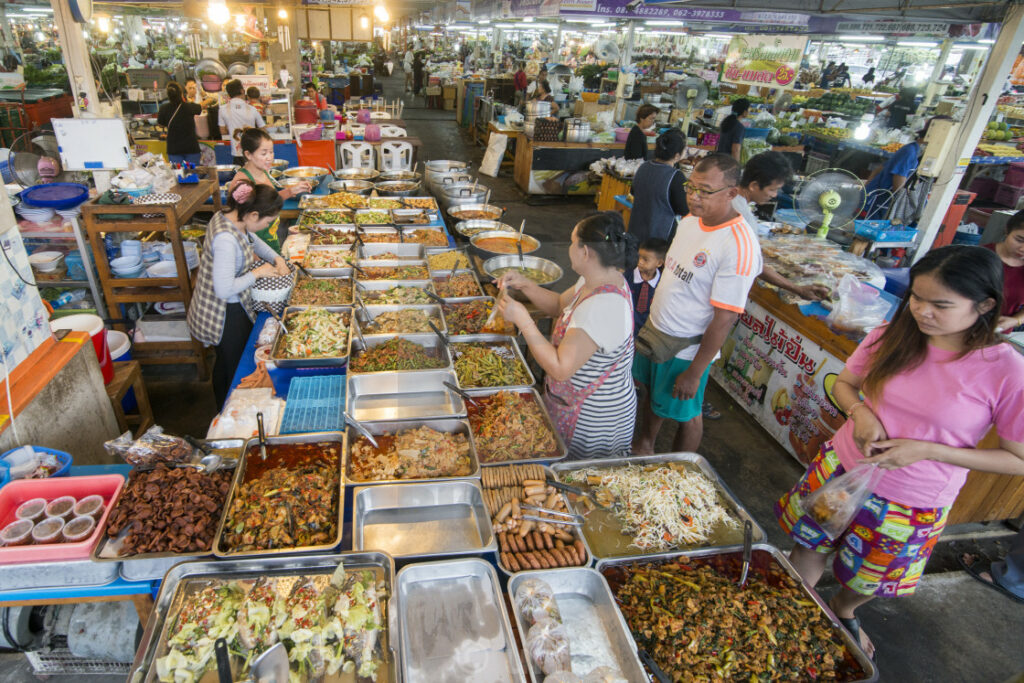
Thais do not really like to cook at home, which is why the catering network is so well developed. The most inexpensive food in Pattaya is in makashnits – transportable mini-cafes with ready-made and cooked food, the average portion costs around 40 baht.
For those who are not ready to eat such food, there are cafes and international restaurants: Russian, Japanese, Korean, Italian cuisines. The average bill differs depending on the level: from 70 baht to 300 baht per dish.
In supermarkets, prices resemble European ones, only in baht, which means multiplied by 2. Milk – 80 baht, bread – 35, beer – 50 baht, seasonal fruits, and vegetables, of which there are a lot – 50-100 baht. But in the world price ranking, for example, Pattaya has the cheapest chicken breasts.
Transport in Pattaya
The transport system in Pattaya is very diverse. Firstly, there is one of the cheapest taxis here (10th place in the world) – about 250 baht for a trip without bargaining in any direction.
Secondly, tuk-tuk – three-wheeled indoor scooters can quickly and cheaply (from 10 baht per trip) take you with a breeze, even over long distances.
Thirdly, minibusses with a number and schedule will take you to various points of the city for 20-30 baht, pay at the exit to the driver.
The cost of renting a car for a long period starts from 13 thousand baht per month depending on the type of car. Renting a bike starts at 3,000 baht, and ends with injuries for inexperienced drivers, so this type of transport may be more expensive than others.
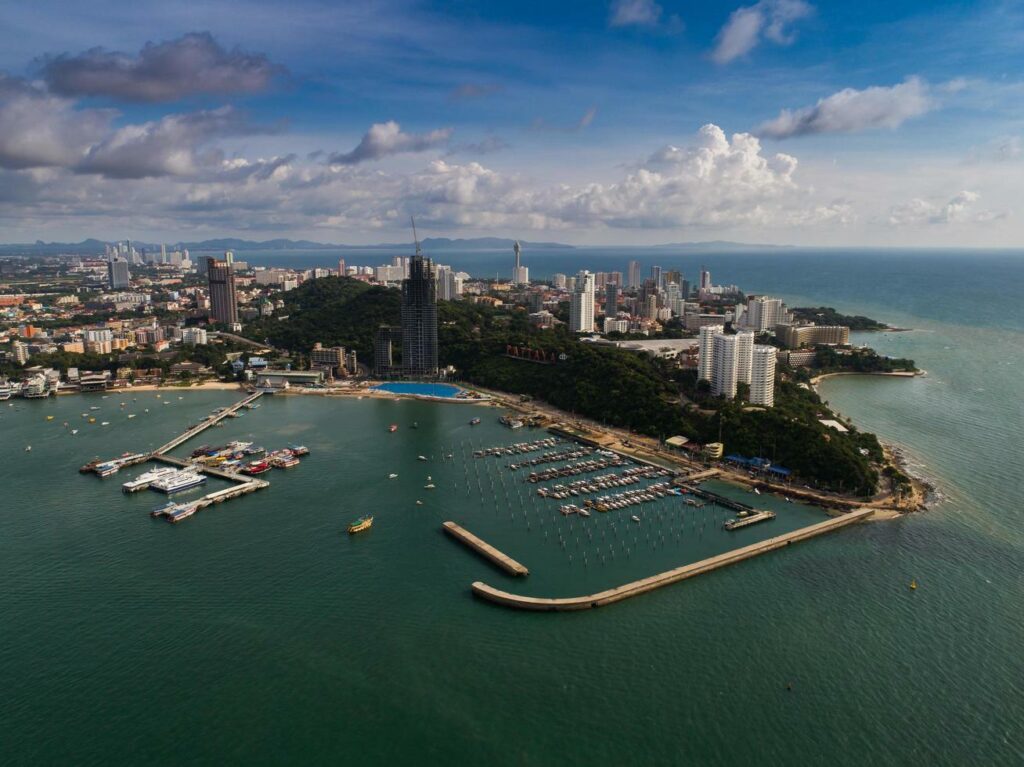
Shopping in Pattaya
The peculiarity and undoubted advantage of hot Thailand with stable daytime temperatures is the ability to do with just a few seasonal things: apart from T-shirts, shorts, and light trousers or sundresses for women, you will need little. An economical option is to buy inexpensive clothes at bazaars and markets that are found here at every turn, the entire wardrobe, including shoes, will cost you 500-1000 baht. In large shopping centers, you can find brand names of clothing, which will undoubtedly be of higher quality and more expensive – on average, 1500-2000 baht per position. Something in between can be found in large supermarkets with clothing departments – Tesco or Macro.
Medicine in Pattaya
Medical care in Thailand is quite expensive, albeit of high quality. A basic examination by a doctor and basic tests will cost 2,000 baht, something more serious, for example, an operation – from 100 thousand baht.
That is why it is recommended to purchase health insurance with sufficient coverage, the minimum cost of the annual insurance is 2500 baht, more complete – 13 000 baht.
According to a study by the Sundee Research group, the cost of living for 4 people in Pattaya per month is 61 thousand baht.
To Thailand for retirement
Emigration to Thailand after retirement is common among Europeans and Americans. But even among our compatriots, retirement to Thailand is gradually gaining popularity. Fortunately, Thai law provides for a special retirement visa, which can be obtained for one year and extended indefinitely.
At the same time, it is absolutely not necessary to really be a pensioner – the age of 50 years is already a sufficient reason for obtaining a retirement visa. In addition, you must have a minimum amount of 800,000 baht in your account.
Permanent residence in Thailand attracts retirees due to the comfortable conditions and measured pace of life. There is a healing sea climate, affordable prices, many spas with wellness treatments.
There are several ways to get a retirement visa:
- Contact the Thai Embassy in your city;
- Come to Thailand on a 30-day stamp and apply for a retirement visa at the immigration office.
If you want calm retirement years, Pattaya is waiting for you!


